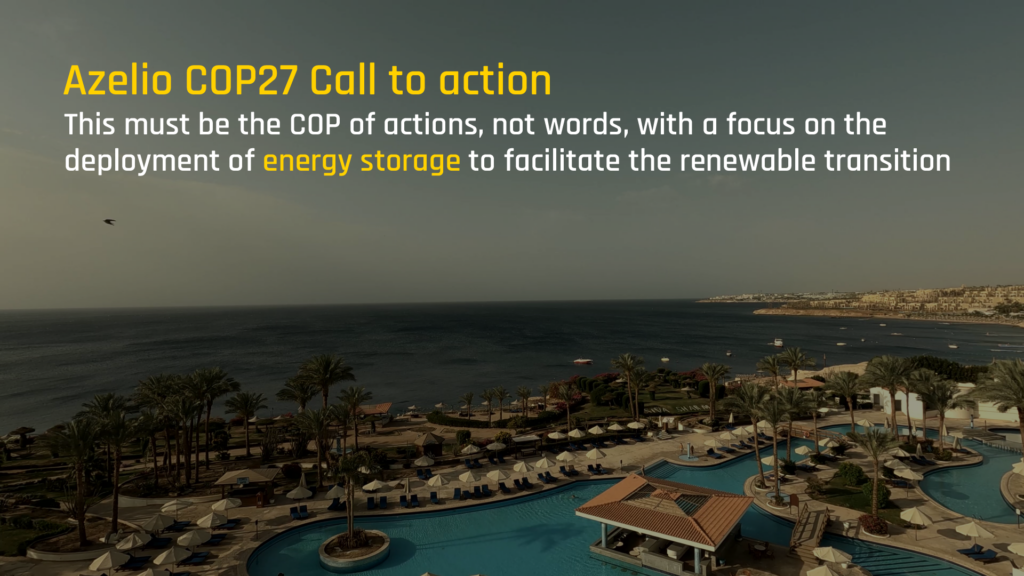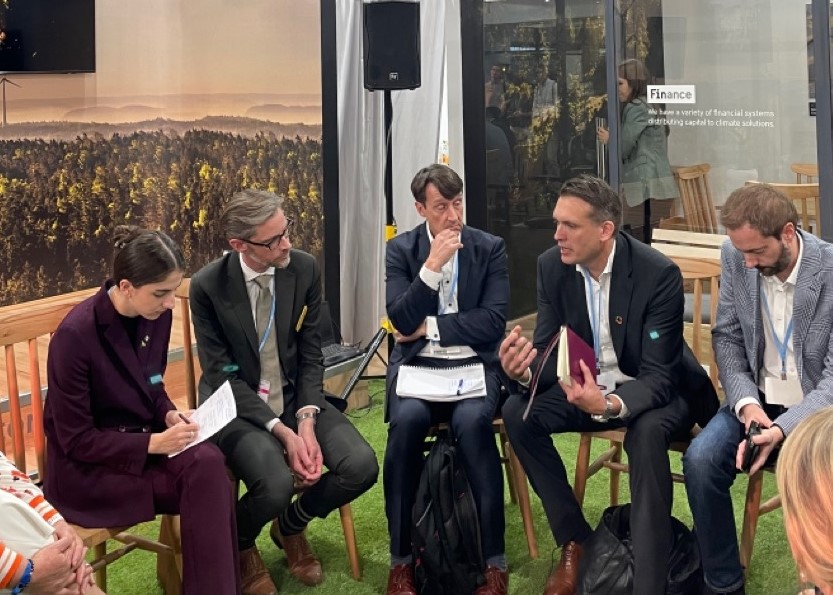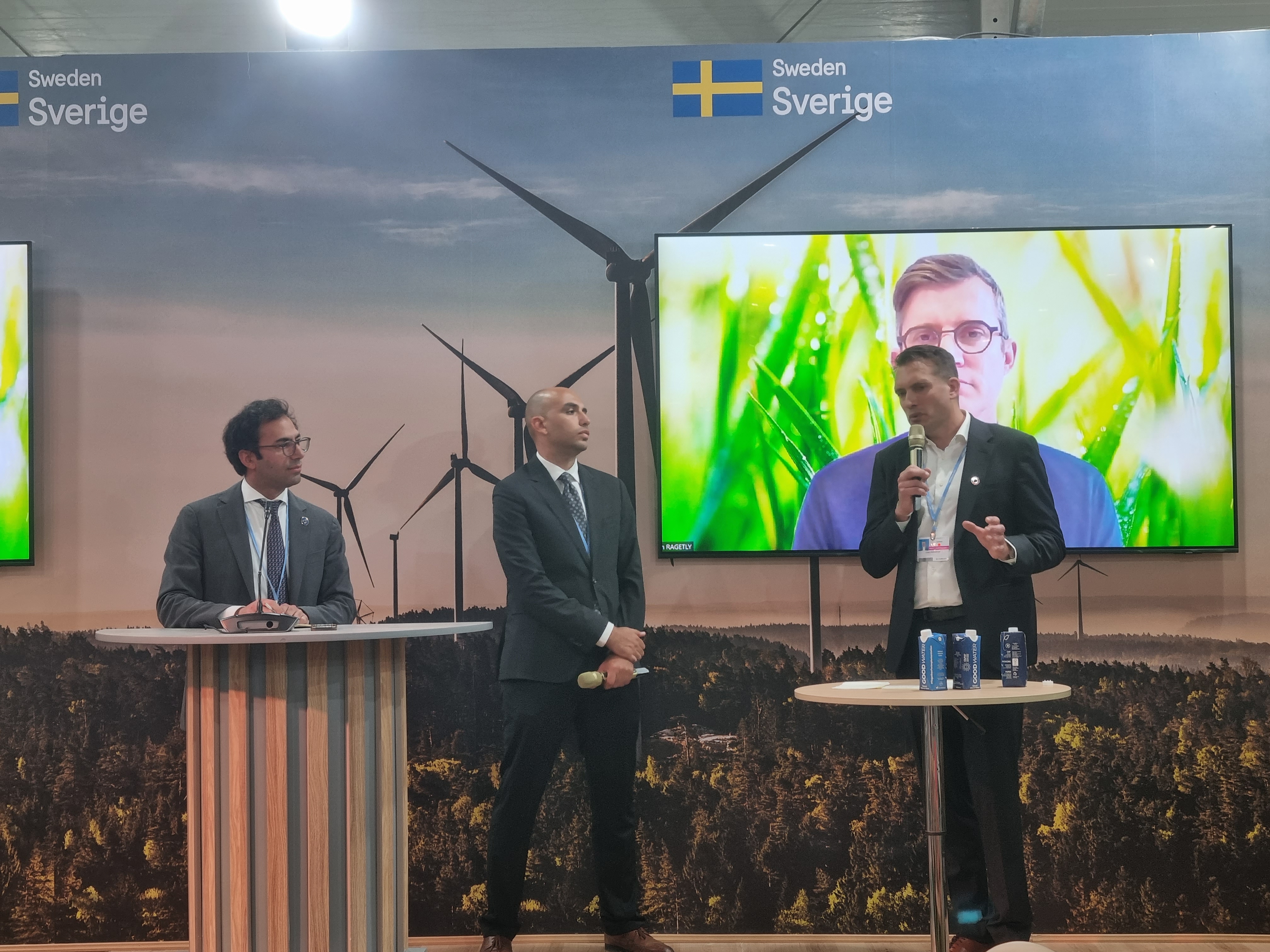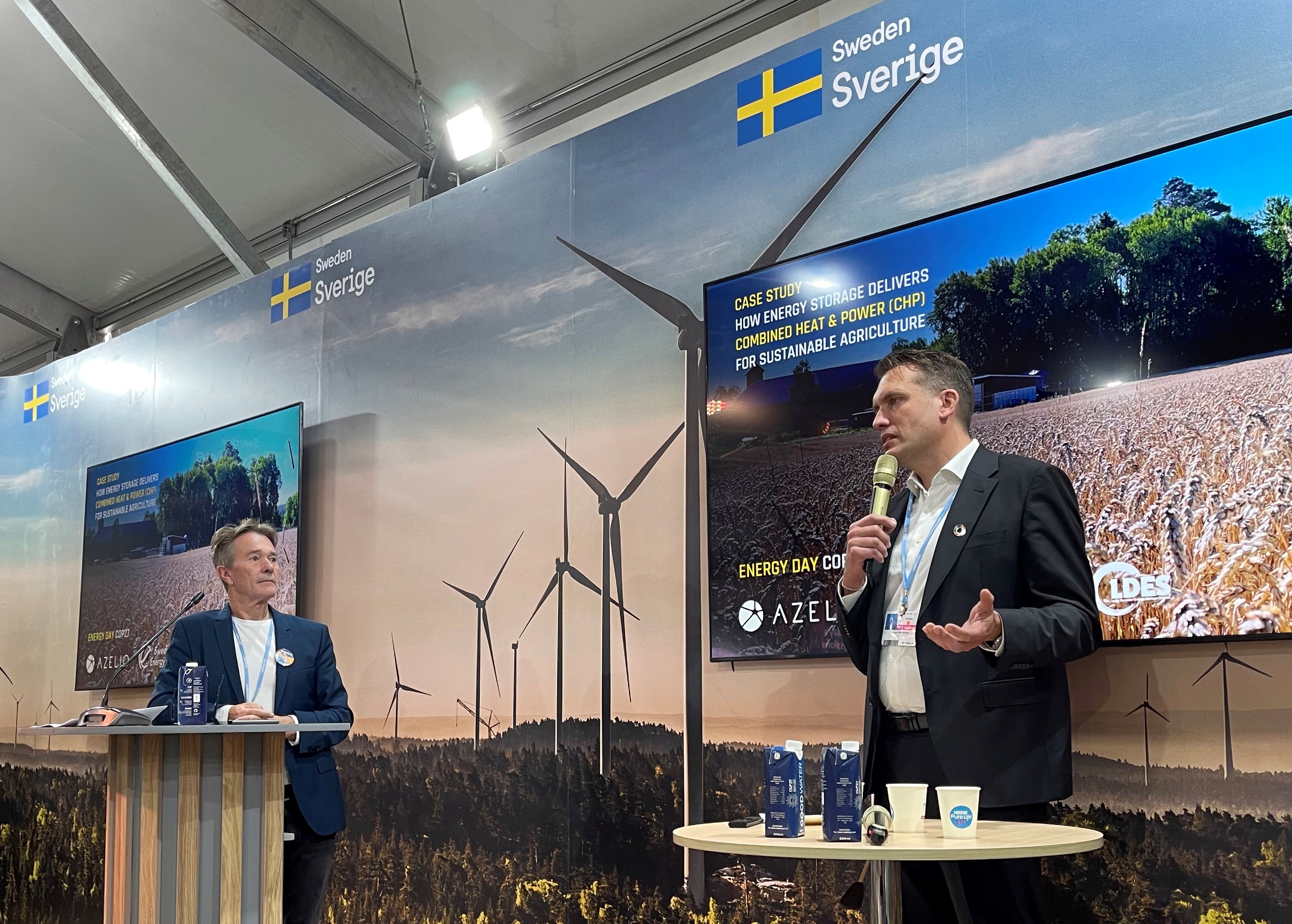2022-11-24
Insights
/https%3A%2F%2Fwww.azelio.com%2Fwp-content%2Fuploads%2F2022%2F11%2FCHP-Case-Study.png)
Azelio COP27 Insights: CEO Jonas Wallmander reflects on a critical climate summit
COP27 is over for another year. Jonas Wallmander, CEO of Azelio, shares his views on a summit that delivered a landmark funding agreement on loss and damage, missed an opportunity to deliver firm actions to combat climate change, and still proffered reasons to remain optimistic.
As the dust settles on COP27, we are left to consider its legacy. What progress did we see at a time when the cost of no action is much higher than the cost of deploying solutions to mitigate the impact of the climate crisis?
Call to action
Prior to the start of the summit in Egypt, Azelio shared a call to action. We hoped for more than just words this time around, urging discussion on the deployment of energy storage and its vital role in the renewable transition.

The missing puzzle piece
While it’s a positive outcome to agree on much needed financial support for countries at the forefront of climate-related disasters – as occurred on the final day, with the signing of a new UN fund for loss and damage – action to address the crisis itself is the key to lasting change. We need to do much more to tackle GHG emissions and rising global temperatures head on. Leaving expensive and polluting energy sources behind is central to this, and long-duration energy storage technologies remain the missing puzzle piece when it comes to the global shift from fossil to renewable.
This was the topic under discussion when I joined a panel hosted by Alfa Laval and Business Sweden, during the opening week in Sharm El-Sheikh. The Long Duration Energy Storage (LDES) Council, of which Azelio is a founder member, was also represented. It was great to have the opportunity to talk about the enormous potential of combining renewable energy and LDES. This gives us the means to cover baseload demand with stable and cost-efficient clean electricity for the full 24-hours, powering our industries and societies towards a carbon-free future.
As the market for intermittent renewable sources such as wind and solar has grown, the need to control them with energy storage has become increasingly evident. We first began using fossil fuels because they have in-built control and reliability. Energy storage systems enable us to bring control to renewables, so we can access heat and electricity whenever they are needed, without emitting CO2.
A time for governments to deliver
This was one of my messages when I met with Swedish government ministers Romina Pourmokhtari (Minister for Climate and Environment), and Johan Forssell (Minister for International Development Cooperation and Foreign Trade), during the COP.
I was also keen to emphasise that for Swedish companies, a vital enabler to facilitate the deployment of sustainable technologies such as LDES, is to de-risk and have state guarantees in place for businesses at the beginning of their commercialisation. This point was supported by several other companies in the Sweden business pavilion, and it’s my hope that the Swedish government will solidify the country’s reputation as a hub of innovation, by doing more to support smaller-scale clean technology in the near term.

With 193 countries pledging at COP26 to move away from fossil fuels, but only 24 submitting updated goals and commitments prior to this year’s summit, we need governments to deliver on their promises now more than ever. As part of the Business Sweden delegation at COP27, Azelio was proud to fly the flag for Swedish engineering excellence, and sustainability – where the country has rightly been seen as an important voice in climate-related discussions. I have to report that this has given way to a perception that Sweden is taking a step backwards amid concerns that with the current budget, the Swedish government will not reach its emission reduction targets set in line with the Paris Agreement. These require that by 2030 the country reduces its emissions by 63% from the 1990 level.
During the COP, I gave an interview to Sveriges Radio P1, alongside other Swedish business leaders including Anders Kärrberg, Head of Global Sustainability at Volvo Car Group. I made clear the importance for Swedish technologies such as Azelio – which are breaking into new markets and helping expedite the green transition – to be backed by a state which is a trusted and credible leader with regard to climate issues.

A groundbreaking alliance
As we all know, the issues discussed during COP27 reach far beyond the borders of any one country. During the summit, alongside our partners Engazaat and Mascara NT, Azelio was thrilled to announce the launch of the SAVE Cleantech Utilities alliance.
The alliance will provide utility solutions supporting sustainable agriculture and the adoption of pioneering technologies to help solve some of the greatest challenges of our time, including access to safe water and clean energy in rural areas, hunger, poverty, unemployment, and social development. By offering an industry-first ‘Water-and-Energy-as-A-Service’ model, the alliance aims to empower businesses in off-grid desert locations to focus their resources on farming activities.
The alliance is a revolutionary undertaking. It not only brings about the possibility to desalinate water with a low CO2 footprint, but the business model solves crucial issues for farmers who might struggle to otherwise raise capital up front. Smaller operations can receive the equipment needed, while agreeing on the most valuable crops to cultivate and methods to use in order to secure a profitable business.
This is something to take great pride in – it’s a model with huge potential, which can be easily replicated. By adding our TES.POD energy storage solution as an integral technology, we are using our expertise to help create a more sustainable future, and aid economic prosperity. Azelio is able to build installations of 0.1 MW up to 20 MW, and it’s this scalability that means we are ideally placed to address the specific needs of the target cases.
It was a great pleasure to take part in sessions within the Swedish and Egyptian pavilions, alongside our fellow SAVE Cleantech Utilities alliance members. We talked about the benefits the alliance can have for energy, food production, and clean water scarcity – which is set to become an increasing global problem as a warmer climate results in more saline water, unsuitable for drinking or agricultural use. We look forward to working together to make a real difference for people in areas severely affected by climate change.

Decarbonising heat
To overcome the challenge of providing clean water and food security in a sustainable way, the provision of decarbonised heat will be an important factor. During the COP, the LDES Council released its Net Zero Heat report, which concluded that thermal energy storage technologies, like Azelio’s TES.POD solution, can lead to system savings of up to $540 billion annually, with 2-8 terawatts (TW) of installed capacity deployed by 2040.
In the summit’s second week, I had the opportunity to share a stage once more with the LDES Council and talk about how TES.POD energy storage can deliver Combined Heat and Power (CHP). The reference point for the discussion was Azelio’s recent successful demonstration of its heat solution in Sweden – a collaboration with the Swedish Energy Agency (Energimyndigheten), which was also a valued participant.

Azelio’s TES.POD system was used in Haneberg earlier this year to supply heat to dry grain, while delivering clean electricity to a farm. The potential to supply low-temperature heat in parallel to clean electricity is tremendous, on a global scale. If we look at agriculture, forestry, and land use alone, we identify a sector which is one of the main CO2 contributors, accounting for an enormous 18.4% of global greenhouse emissions.
During the summit, Azelio released a white paper detailing the benefits to the Levelised Cost Of Electricity (LCOE) that the introduction of heat brings to a business case. By adding heat as well as electricity to Azelio’s offering, the total efficiency of the system is increased to achieve up to 90% – this means that businesses can meet their main energy needs, while reaching their net-zero goals with affordable and reliable clean power.
The cost of waiting
When I look back on my time at COP27, I have to conclude that it was a flawed summit in many ways. This was an event representative of the still unequal gender balance that exists in the discussion on climate change, and it was by no means the summit of actions that Azelio called for beforehand. We have passed the point of no return on limiting global temperatures to 1.5C, with our window for sufficiently cutting CO2 emissions having closed. Together we must accelerate the renewable transition, and there is no further time to lose.
During the summit I noted an existing knowledge gap between solutions which can help us get there further down the line, and disruptive technologies that are here and available for deployment now. That gap is beginning to close, but the longer we wait to embrace market ready solutions, the higher the cost will be – both economically and for humanity. Long-duration energy storage is available today. It offers a clear pathway to decarbonisation and it’s increasingly becoming part of the agenda. This is a cause for optimism, and it’s not the only one.
Reasons for optimism
In our partnerships with Business Sweden, the LDES Council, We Don’t Have Time, the Swedish Energy Agency, and the Solar Impulse Foundation among others, Azelio sees a spirit of collaboration and a series of dedicated organisations striving to deliver a better and more sustainable future.
In the SAVE Cleantech Utilities alliance, we are proud to be offering our LDES technology and joining such strong co-founders to change the way projects are executed in support of sustainable agriculture and renewable desalination.
The core value of Azelio is sustainability. It runs through everything we do, and we will continue our mission to make renewable energy affordable and available the moment it’s needed, with long-duration storage. We aim to power the evolution of a renewable society for people, businesses and above all, our planet.
Want to know more?
/https%3A%2F%2Fwww.azelio.com%2Fwp-content%2Fuploads%2F2022%2F11%2FPasteurisation-Heat.jpeg)
Combined Heat & Power
Meeting two critical energy needs
/https%3A%2F%2Fwww.azelio.com%2Fwp-content%2Fuploads%2F2022%2F01%2FTES.POD_cluster.png)
The Solution
Making renewable reliable 24/7
/https%3A%2F%2Fwww.azelio.com%2Fwp-content%2Fuploads%2F2022%2F01%2FFarmers-CEI-Campaign.jpeg)
Let's work together
Strong partnerships drive change
/https%3A%2F%2Fwww.azelio.com%2Fwp-content%2Fuploads%2F2022%2F01%2FFarming_LOW.jpg)